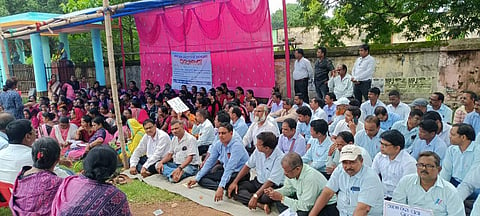

More than one lakh primary and upper primary government school teachers in Odisha have taken to the streets once more as their demands remain unfulfilled by the government. The indefinite protest, being held at Lower PMG in Bhubaneswar, entered its eighth day today, September 15, but teachers mention that the government is yet to respond.
What happened so far...
The developments date back to November 2022, when teachers from across Odisha organised a mass rally at the same place for three days over their demands. The government, in response, had assured them that their demands would be looked into, and had set up a panel accordingly. Later, however, the teachers were told that working on their demands would take more time. "Now eleven months have passed. How much more do we need to wait?" questions Tulu Dei, Senior Assistant Teacher from Utkalamani Government Primary School at Jatni in the Khordha district.
She states that the teachers disbanded their protest last year only because of the government's assurance. "Between December 2022 and August 2023, the government set up committees and discussed the matter. We also met the officials, including the Commissioner, Secretary and Minister of Mass Education, several times. Last month, the government called us for meetings two to three times. But there is no progress. The conclusions of all these meetings and discussions were mere assurances. The officials told us they are looking into our demands and would need more time to process them," Dei says.
After the protest in November, the government had publicly assured the teachers that a solution would be doled out in December. When the deadline approached, the government announced once more that they would need time till mid-January. Then the deadline was pushed further, and by April, when the teachers were not updated on the issue, they decided to hold a protest again. "But the government did not give us permission. This is the first time something like this happened. And thousands of teachers who had gathered in the city had to return back. It was a waste of our time and money, and those who had travelled from remote areas were the worst hit," Dei narrates.
Three associations come together
When no updates came on the matter even after this, the teachers were determined to take to the streets again, starting from September 8. This time, about 1,30,000 teachers from all 314 Block Offices (BOs) of Odisha are participating in the protest. Three associations, namely the All Odisha Primary Teachers' Association, Odisha Primary Teachers' Association and the Primary School Teachers' Association (PSTA), have come together to form the All Utkal Primary Teachers' Federation (AUPTF) to take the protest forward.
As a result, however, teaching activities at more than 50,000 schools have been affected. "We are appointed for teaching and it is very sad that we have to resort to protests. It is very much against our wishes. But we are being forced to take such steps because of the government's apathy," the teacher regrets.
Elaborating on the difficulties being faced in the schools because of the agitation, Dei says that only the deputed teachers and a few other workers are left in charge of the children, who are taking care of them and serving them midday meals. "But there are about a hundred students in each school. How can only one person take care of all of them? This is impossible! The government should, therefore, resolve our issues soon so that we can resume our duties," she states.
The teacher further says that they are not asking any more than what benefits are guaranteed to them under the Right to Education (RTE) Act. "We are fulfilling all our teaching and non-teaching duties. We are putting in the hours. Then why can't we get what is our right?" she asks. Notably, they have been asking the state government to act on the matter since 2001.
The teachers have three clear demands:
1. Abolishment of contractual employment: The concept of contractual employment started in 2001, and the primary education department was the first one to implement it. At that time, the government was facing a financial crunch, but the situation has changed now, making contractual hiring unnecessary, the teachers say.
2. Better pay: The protesters cite that primary teachers employed by the Central government receive salaries according to the 7th Pay Commission, with grade pay of Rs 4,200. Other state governments also pay their primary teachers well, with grade pay of around Rs 3,600, with the minimum being Rs 2,800. But in Odisha, it is only Rs 2,200, even though the Centre and state governments disburse it in a 60:40 partnership.
3. Scrapping the new pension scheme: It is alleged that with the new pension scheme implemented in 2005, the primary teachers' pension has been reduced to a mere Rs 800-900, which is grossly insufficient even for one person, whereas with the old scheme in place, they had a secure income after retirement.
Dei alleges that these benefits were conferred on secondary school teachers without any hassle when they demanded them, but the delay for primary teachers has been unending. "Crores of rupees are being spent on implementing the 5T policies, but when it comes to spending on education which is a basic necessity, the government says funds are the issue, and resolving the matter with the finance department is taking time. The government is still asleep," the teacher laments.
As per news reports, the opposition BJP and Congress have criticised the government for its inaction. Meanwhile, the state government has appointed a five-member sub-committee to review the protesters' demands. The Director of Elementary Education has dismissed the teachers' protest as a "gross misconduct" and warned them of consequences for taking mass leave and joining the agitation, as per a report by The New Indian Express.
